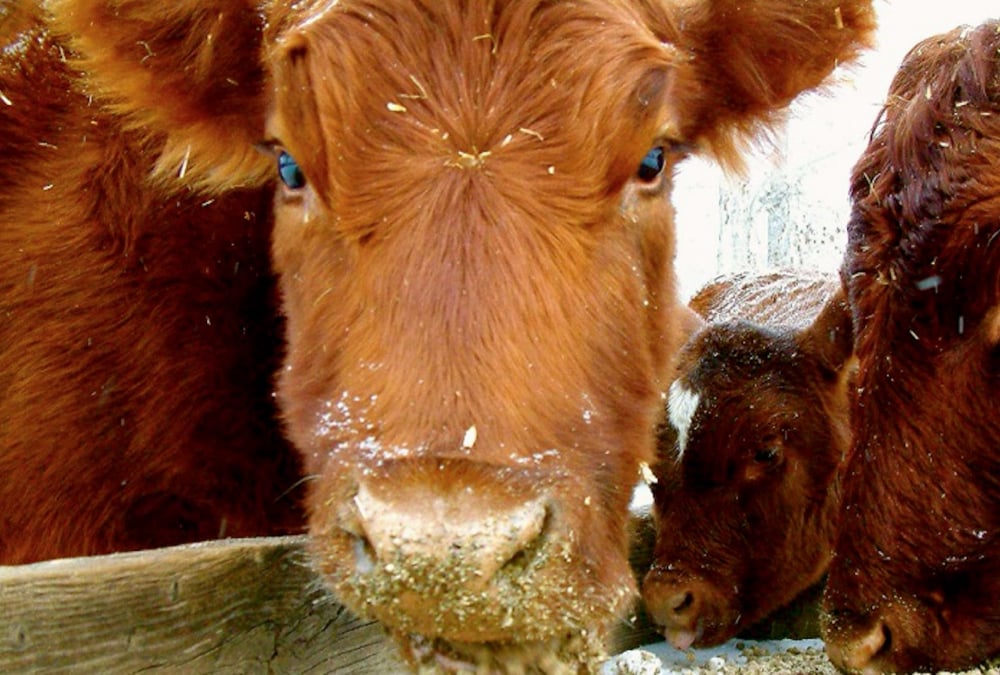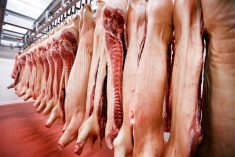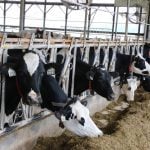Workers at three Olymel hog slaughter plants in Quebec volunteered for overtime shifts over the weekend to help clear the province’s backlog of market-weight hogs, the company said Saturday.
Sollio’s meat packing arm said over 800 workers at its slaughter plants at Yamachiche and St-Esprit and the former F. Menard plant it now owns at Ange-Gardien volunteered for the added Saturday shifts, “in order to reduce the number of hogs ready for slaughter and avoid euthanizing them.”
The backlog of market-weight hogs in the province “has never been so high,” Olymel said, pegging the number at over 100,000 head, as processing capacity shrunk against the COVID-19 pandemic.
Read Also

U.S. livestock: Live cattle correct higher
Live cattle futures on the Chicago Mercantile Exchange were stronger on Monday, taking back some of Friday’s losses amid ideas…
Outbreaks among employees in the sector led not only to reduced capacity at other plants but a temporary closure at the Yamachiche plant in late March.
Furthermore, Olymel said in a release Saturday, “the closure of many slaughterhouses in the United States has also deprived Olymel of an outlet that would have allowed it to deliver the surplus of hogs ready for slaughter in Quebec and Ontario to high-capacity American plants.”
Staff from the company’s St-Hyacinthe ham boning plant and F. Menard’s Agromex further-processing plants at St-Jean-sur-Richelieu and Sherrington “will support this initiative through packaging and storage activities,” Olymel added.
The company didn’t give a number Saturday by how much it expected to reduce the backlog through the extra shifts.
The Ange-Gardien plant has capacity to slaughter about 25,000 hogs per week on a single shift, while the Saint-Esprit slaughter, cutting and boning plant processes up to about 26,500 hogs per week over two shifts. The former Atrahan plant at Yamachiche can slaughter up to 40,000 hogs per week, following a major expansion last year.
“Since the beginning of the pandemic, Olymel has implemented extensive health measures to prevent the spread of the virus and better protect the health of its workers in all its facilities,” the company said Saturday.
“After slowdowns and interruptions, Olymel’s hog slaughterhouse and cutting plants in Quebec have now regained more than 95 per cent of their slaughtering capacity.”
Olymel CEO Rejean Nadeau said the pandemic measures put in place at its plants will now allow it to help deal with the hog backlog, but also hailed employees and union reps for their co-operation in setting up the extra shifts.
Donations per hog
Also, the company said, its managers, volunteer employees and union reps “were keen to make this day even more useful” with a fundraising effort “to help underprivileged people and the organizations that support them.”
For each hog slaughtered on the extra shifts, Olymel said, $2 is to be donated to a charity or cause chosen each plant’s employees choose, up to $5,000.
Also, the company said, working with les Cuisines solidaires of La Tablée des Chefs, Olymel “will provide food to prepare three meals for each employee present during this additional slaughter day” for selected food banks.
That’s expected to produce the equivalent of over 2,000 meals, bound for Moisson Mauricie-Centre-du-Québec for the Yamachiche plant, Moisson Lanaudière for the St-Esprit plant and S.O.S. Dépannage-Moisson-Granby for the Ange-Gardien facility, Olymel said.
“I am grateful that (employees) not only agreed to add hours to their workload after already very busy weeks,” Nadeau said, but also for their support of food banks and people in need “at a time when mutual assistance is as essential as the activities of the food supply chain.” — Glacier FarmMedia Network
















